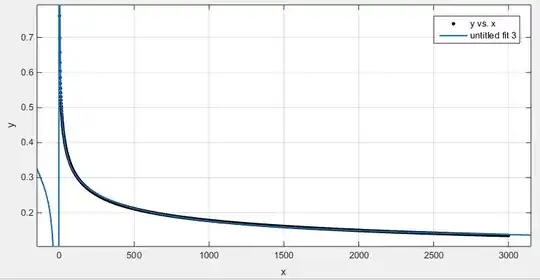I'd like to find a rational representation of
$$f(s) = \frac{\tanh\,\sqrt[4]{s}}{\sqrt[4]{s}}= \frac{a_0 + a_1 s + a_2 s^2 + ... + a_n s^n}{b_0 + b_1 s + b_2 s^2 + ... + b_m s^m} $$
For the case $$f(s) = \tanh\,\sqrt{s}$$ I solved the problem with this answer - the Padé approximation seems perfect, as all $z$ in the resulting function have the power 2 or 0 - so I can get rid of the square root. $$\tanh\,z\approx\mathcal{T}_3(z)=\frac{z(600 + 70 z^2 + z^4)}{600+270z^2+11z^4+\frac{z^6}{24}}$$ $$\frac{tanh\,\sqrt{s}}{\sqrt{s}} \approx \frac{600 + 70 s + s^2}{600 + 270 s + 11 s^2 + \frac{1}{24} s^3} $$
But I'm really struggling for the case $\frac{\tanh\,\sqrt[4]{s}}{\sqrt[4]{s}}$.
For discrete values Matlab offers a nice fit via Least-Squares:
f(x) = (p1*x^5 + p2*x^4 + p3*x^3 + p4*x^2 + p5*x + p6) /
(x^5 + q1*x^4 + q2*x^3 + q3*x^2 + q4*x + q5)
Coefficients (with 95% confidence bounds):
p1 = 0.1091 (0.1087, 0.1095)
p2 = 155.8 (22.49, 289.2)
p3 = 4829 (-1.874e+05, 1.971e+05)
p4 = -493.8 (-5.957e+06, 5.956e+06)
p5 = 1442 (-1.922e+06, 1.925e+06)
p6 = -441.9 (-8.783e+06, 8.782e+06)
q1 = 521.7 (-705.4, 1749)
q2 = 6467 (-6.379e+05, 6.508e+05)
q3 = 309.6 (-7.915e+06, 7.916e+06)
q4 = -735.6 (-1.378e+06, 1.376e+06)
q5 = 636.3 (-9.718e+06, 9.72e+06)
Goodness of fit:
SSE: 0.006849
R-square: 0.9993
Adjusted R-square: 0.9993

But isn't it possible to achieve the same analytical?
My range of s is 50 to at least 3000.
I'd appreciate any hints! Thank you!